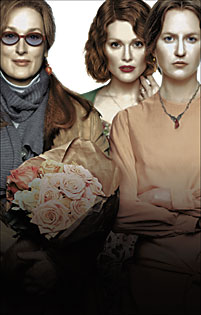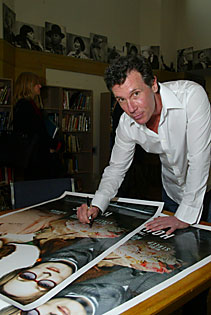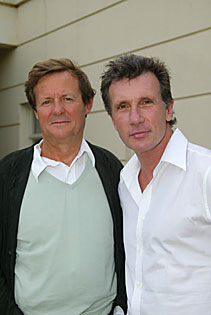 |
|
PHOTO COURTESY MIRAMAX PICTURES
|
Michael Cunningham's 1998 novel "The Hours," based on Virginia Woolf's novel "Mrs. Dalloway," is now also a movie.
|
|
By Lindsay Utz
Arizona Daily Wildcat
Thursday February 6, 2003
Pulitzer Prize-winning author Michael Cunningham discusses taking risks, being a reader and the movie adapatation of his novel "The Hours"
When Michael Cunningham decided to emulate the style of one of literature's most brilliant writers, he risked facing strong resentment from lovers of Virginia Woolf, the great writer and feminist who served as the inspiration for his Pulitzer Prize-winning novel, "The Hours."
For Cunningham to take this bold step into unknown territory seems fitting because Woolf herself was a pioneer, a strong female voice in a time of stifling oppression for women. She was dangerously aware of the world around her, seeing something quiet and delicate in the small details of life.
"The Hours" is a novel about the novel "Mrs. Dalloway," written by Woolf. The book follows a day in the life of three women: Woolf, the day she kills herself, Laura, a 1950s housewife, and Clarissa, a modern day New Yorker. The three stories are intertwined and linked together by "Mrs. Dalloway," not only in making references to it, but more importantly in that "The Hours" uses the same prose, mood and tone of Woolf's classic novel.
Now the newly released film, based on the novel, is sending whispers of many Oscar nominations through the air. It's a curiosity in both literature and Oscar history to have such a delicate, literary book-turned-movie be so successful and so well-received.
"I think it's enormously important and good news for everybody," Cunningham said. He seemed surprised that people would embrace a difficult film about three brilliant, complicated women - a film in which not much "happens" by way of plot, but whose subtext remains dense, like a book.
"It suggests to me that the American movie-going public is not as stupid as they're generally made out to be," he disclosed.

PHOTO COURTESY MIRAMAX PICTURES
|
Growing up in Los Angeles as a skateboarding and partying teenager oblivious to literature, it is remarkable that many years later Cunningham went on to write a book that won an award as prestigious as the Pulitzer. After picking up a copy of "Mrs. Dalloway" on the advice of a girl who suggested he be "less stupid," he found the early inspiration for "The Hours".
"I had no idea what it was about. I was a not very bright 15-year-old," he admitted. "But I could see the beauty and complexity and music of Woolf's language, which was a revelation to me."
"I remember thinking, 'Oh, she was doing with language something like what Jimi Hendrix does with a guitar.' It really knocked me out. It made me begin to understand that a book could be a big living presence in your mind, it could really jump of the page and matter to you in a way that no book had ever mattered to me before. It made me into a reader, and ultimately into a writer."
Falling in love with writing, with anything, is a transforming experience. But what you love doesn't always love you, and with any creative process, especially writing, there is struggle and self-doubt.
"My conviction about whether or not I'm very good at it sort of comes and goes, but I have never since I was ... 18 years old lost my interest in it. It's the one thing in the world, the attempt to create something like life on paper, that never bores me.
"It's easy to feel terrified and embarrassed and," he sighed, "small in the face of what you're trying to do. You always want to write a better book than you're able to write even if the book comes out pretty well. You always have a greater book in your mind. And that's hard."
Trying to tackle the language and give justice to the life and thoughts of Virginia Woolf was hugely daunting to Cunningham.
 |
|
"The closer you stand to a great figure, the smaller you're likely to look.
-Michael Cunningham
|
 |
"The closer you stand to a great figure, the smaller you're likely to look," he said. "I finally decided to do it because ... why would you want to write a book you know you could write? If you're going to go down in flames, why not go down in big flames?"
Fortunately Cunningham's book came nowhere near going down in flames. Instead, it took off, bringing about a rebirth of Virginia Woolf's work as well as introducing modern characters, women who share the same deep despair and delicacy as Woolf.
"I have such a clear image of my characters, I know them so well, I know what they look like, how they move, how they speak. I feel like if you know the people you're writing about they will create a story," he explained.
"If you're thinking of a story and just looking to fill it with characters they're not so likely to come to life. They're going to end up just sort of acting out the story you want them to act out and they don't develop depth and individuality and the kind of spark that you want in your characters. I imagine a person and then sort of see what that person does."
"All of my characters are sort of composites of people I know ... but of course you work with what you know and what you know is so much about the people around you. Everybody in the novel is a little bit of this person, a little bit of that person. Laura Brown is to a very real extent my mother and also somebody else entirely."
 |
|
PHOTO COURTESY MIRAMAX PICTURES
|
Michael Cunningham stands with David Hare, who, as screenwriter for "The Hours," adapted Cunningham's novel to the big screen.
|
|
Making the transition from book to film is risky because what was once in the author's control is now in the hands of many other hundreds of people.
"It's so very difficult to produce anything good, whether it's a novel or a painting or, God forbid, a whole movie that requires the participation of hundreds of people," he said.
Adapting a book, shifting mediums, without losing the essence of the story is extremely difficult, but Cunningham was pleased with the job David Hare did of adapting his novel.
"I feel like he is very good at not only getting the character of a woman but not underestimating women, not treating them as anything other than what his characters always are, which is brilliant, tormented, inspired, complicated people."
The two spent a whole day together before Hare starting writing. They talked exclusively about the characters, Hare wanting to know everything that happened to the characters from birth to death, every detail that was not in the book.
"The movie has a life of its own, it's very close to the book, but it's also a work of art unto itself. David managed the transitions beautifully, it holds together remarkable well. It managed to preserve something that I love in Woolf that I tried to bring to my own novel; this sense of a certain hope, a certain optimism if you will, that can survive the worst that could happen to people, which is really the only kind of optimism I trust."
Though the script follows the book almost faithfully, there was one major dispute between Cunningham and Hare over how Laura Brown attempts to kill herself. Hare wanted Laura to have a gun while Cunningham knew that Laura would never make that kind of mess. Hare eventually gave in.
Cunningham didn't work one-on-one with any of the actresses except Meryl Streep. She wanted to know some particulars about her character, Clarissa, such as what kind of music and movies she would like.
He was thrilled with the women cast into the lead roles: Meryl Streep, Julianne Moore, and Nicole Kidman. Although no women are exactly how they are in the novel, Cunningham is excited to see Hollywood's leading ladies playing his beloved characters.
"You kind of make the leap and appreciate what that actor can bring to the character. No one of the people in the movie is exactly what I imagined, and yet all of them I think really are remarkable."
"The Hours" is Cunningham's third novel. "A Home at the End of the World" (1990) was his first, followed by "Flesh and Blood" (1995). Themes of homosexuality are prevalent in all his works because as a gay man, it's something he knows about. Yet he prefers that his work not be classified into the gay/lesbian genre.
"One of the things I'm so happy about in the way that 'Hours' has been received is no one really talks about it as a lesbian novel. It's a novel about human beings, some of whom happen to be gay."
"The Laura in my book and the Laura in the movie is nothing quite so simple as a closeted lesbian," he explained of the scene where, for a moment, a '50s suburban housewife reveals her veiled homosexuality.
"She loves her husband, she's attracted to her husband and for that moment she's also attracted to Kitty. And the kiss is part sexual and part a kind of moment of shared recognition, it's her way of trying to comfort Kitty."
Screening the film for the first time, as the lights went down and the screen lit up, Michael Cunningham watched as his novel, a work born from the simple routine of picking up a book, the kind of small detail Woolf would have written about, came to life.
"The first time I sort of watched it in a deranged state," he remembered. "It's surreal. It was one of the strangest experiences I've ever had."
As "The Hours" book and film ride their success, "Mrs. Dalloway" is climbing bestseller lists across the country. With Golden Globes won and rumors of an Oscar sweep stirring, Cunningham sits in his studio in New York City, still writing.
"Ideally, I'd like to write about everybody. You do what you can in the time you're given."

